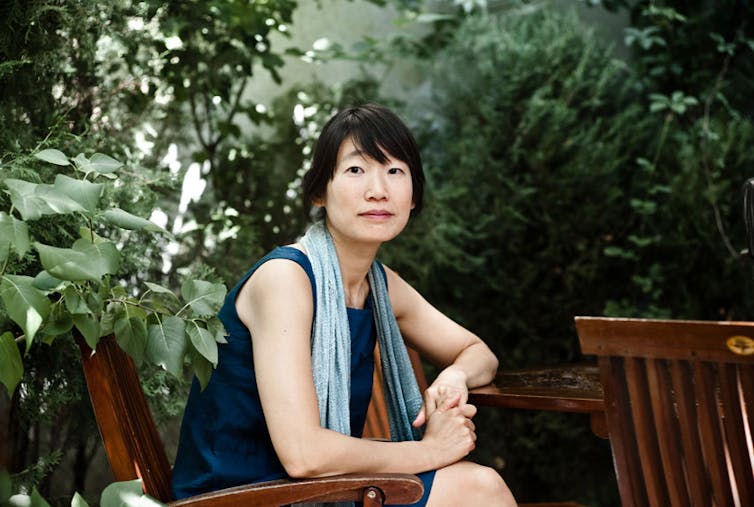Detta inlägg post publicerades ursprungligen på denna sida this site ;
Date:
Author: Rss error reading .
Original article: https://theconversation.com/the-book-of-records-by-madeleine-thien-a-sobering-meditation-on-the-human-condition-255162
The Book of Records by Madeleine Thien intricately blends historical and speculative fiction to tackle contemporary global issues. It explores migration, the refugee crisis, identity politics and cultural conflict.
At the heart of the novel is Lina, a young girl who escapes her homeland with her ill father. She finds herself in a mysterious, shape-shifting place known only as “the Sea”. This ambiguous setting, likened to a temporary shelter or refugee camp, serves as a metaphor for statelessness, displacement and a loss of identity. The Sea’s geography is deliberately unclear – as is Lina’s origin, her homeland and the fate of the rest of her family. This emphasises the book’s themes of rootlessness and exile.
Lina arrives in the Sea as a child and remains there into her late 50s, bound by her loyalty to her ailing father. She lives in limbo, experiencing the heartache of her mother and brother’s absence and haunted by her family’s fragmentation.
Lina’s life becomes one of stillness and minimalism, revolving around caring for her father. She finds solace in the few items she brought with her, notably three volumes from The Great Voyagers encyclopaedia. She becomes obsessed with these books, reading them repeatedly until she has memorised them. They come to shape her intellectual and emotional world.
Looking for something good? Cut through the noise with a carefully curated selection of the latest releases, live events and exhibitions, straight to your inbox every fortnight, on Fridays. Sign up here.
These volumes also form the intellectual structure of the novel. In her mind, they are personified as three characters – Blucher, Bento and Jupiter. Each represents a distinct philosophical perspective and embodies historical figures from different periods and places, including Europe and Asia. They, like Lina, are portrayed as refugees living in the Sea. They appear across different stages of her life – adolescence, adulthood and old age – offering guidance and companionship.
Blucher is modelled after Hannah Arendt, the German-American philosopher and historian who escaped Nazi persecution. Through her, the novel explores themes of dehumanisation and survival under oppressive regimes.
Bento’s character represents the figure of Baruch Spinoza, the 17th-century Portuguese-Jewish philosopher. He was excommunicated from his Amsterdam community due to his radical and rationalist views of religion, reason and freedom. From him, Lina learns about the cost of intellectual and moral independence.
Jupiter resembles the Chinese poet Du Fu, who suffered political and personal turmoil due to his criticism of the state during the Tang dynasty (AD618 to 907). His story conveys the risks of speaking truth to power and the ethical sacrifices such acts may demand.
Through interactions with these three, Lina gains insights into resilience, suffering, and the philosophical implications of exile and survival.
Wiki Commons, CC BY-SA
Blucher teaches her about the psychological strategies used by Holocaust survivors, including the detachment of self from suffering. Bento’s story reveals the loneliness of ideological estrangement and the commitment required to uphold your beliefs against societal rejection. Jupiter imparts the painful consequences of challenging authority, and how artistic and political expression often come at great personal cost.
Enduring and resisting
While the novel is set in a speculative future, its most potent and emotionally resonant passages are grounded in the historical experiences of Blucher, Bento and Jupiter.
Lina’s story is less compelling and comparatively more subdued. It serves as a lens through which the reader reflects on a dystopian world shaped by today’s challenges – rising nationalism, populism and polarisation, and environmental collapse. Her story symbolises the psychological toll of prolonged displacement and the quiet endurance of everyday life under extraordinary pressures.
Ultimately, The Book of Records is a sobering meditation on the human condition in times of crises. It critiques historical cycles of oppression while illustrating how people retain dignity, compassion, and philosophical depth in the face of adversity.
Lina’s companionship with Blucher, Bento and Jupiter becomes a testament to how survival is not merely about endurance, but about how we preserve and interpret our values. The novel emphasises that even amid chaos, acts of kindness, understanding and intellectual inquiry remain vital forms of resistance.
Manjeet Ridon does not work for, consult, own shares in or receive funding from any company or organisation that would benefit from this article, and has disclosed no relevant affiliations beyond their academic appointment.
